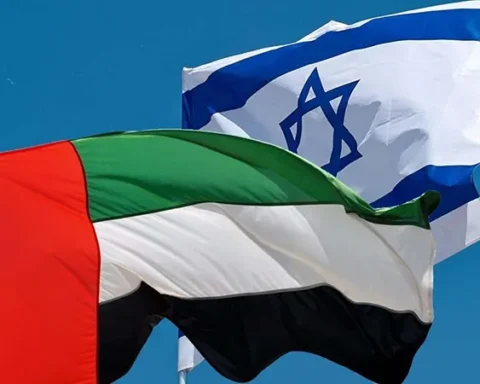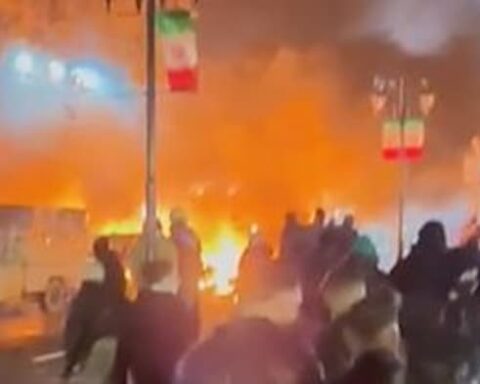I noted a few days ago the similarities between the late Yemeni President Ali Abdullah Saleh and the late Libyan leader Muammar Gaddafi.
We noted that the unsettling footage circulating on the Internet and some news channels of his death were eerily reminiscent of the brutal murder of Gaddafi in October 2011.
And we also noted that Saleh (pictured above with two other casualties of the Arab Spring, Gaddafi and Mubarak) had other similarities to Gaddafi in terms of his decades-long rule, his carefully nurtured relationships with the Yemeni tribes and factions that allowed him to keep order and stability in the country for so long, and how he – like Gaddafi – fell victim to the ‘Arab Spring’.
Something else Saleh had in common with Gaddafi had been a belief in the ideas of pan-Arabism and a particular admiration of President Nasser in Egypt, who, as it happens, was also a major inspiration for Gaddafi.
I have for a long time been intending to post an article here about pan-Arabism or the age of Arab nationalism – but I’ve failed to finish writing it yet. The pan-Arab ideas were particularly zealously pursued and promoted by Gaddafi in the 1970s, the general idea being an alliance of strong, independent and secular Arab nationalist states who would share common interests, including common defense and economic policies.
In some form or another (and to varying degrees), these ideas were pursued for some years in Libya, Syria, Iraq and Egypt.
That there was corruption and dictatorship and suppression isn’t in doubt. There was also order, stability, strong economic growth, and there was no room for anarchic jihadist/Islamist groups or agendas to achieve anything. Those countries were being held together around a national identity and a strong sense of independence and sovereignty.
It is difficult to wholeheartedly defend regimes that were so dictatorial and so harsh in their suppression of opposition. But it is also a fact that the collapse of those regimes and ideas has done little or nothing for the populations of those countries: unless anyone thinks what has happened in Iraq after the US-led invasion or in Libya, Syria or Egypt or Yemen after the Arab Spring has been good.
Which, I’m sure, is no one.
With all of that in mind, it is very interesting to note what Saleh himself said about the Arab Spring.
In a 2014 TV interview, Saleh called it the “Zionist Spring”, describing it as a Zionist-Western conspiracy to “bring down the pan-Arab enterprise.”
This idea was in fact the basis for the very long article I was writing (but never finished) on Pan-Arab Nationalism – the idea that the ‘Arab Spring’ was in fact part of a programme to kill off what was left of those ideas and to cause the collapse of several strong, independent and secular Arab states and turn them into chaotic, sectarian quagmires at the mercy of extremist factions and feuding idealogies.
This was clearly the view Ali Abdullah Saleh also held.
Here are some excerpts from that interview, which was broadcast by the Egyptian CBC network in 2014.
I’m not necessarily agreeing with every element of what he says here; but his position is very interesting.
Interviewer: You mentioned the “so-called” Arab Spring…
Ali Abdallah Saleh: It was a Zionist Spring.
Interviewer: Please explain why you call it the Zionist Spring.
Ali Abdallah Saleh: Since there was no democracy in some Arab countries, young people expected this “Arab Spring” to improve things, in culture, economy, security, and politics. But instead, it brought about a sweeping anarchy as you can see in Libya, Tunisia, Yemen, and Syria, as well as in Egypt. This led the youth and the people who sought improvement to despair. I was one of the rulers, but I hoped that they would give rise to someone who would function better than me and my government.
Interviewer: Would such a thing have made you happy?
Ali Abdallah Saleh: Completely happy. But it brought nothing but anarchy, the disintegration of nations, the destruction of the infrastructure and the economy, and the deterioration of the army and security services. The Muslim Brotherhood entered the units of the army and security services, with no training, qualifications, or organization. Anarchy! That is why I called it the “Zionist Spring.”
Interviewer: Do you think it was a Zionist-Western conspiracy?
Ali Abdallah Saleh: Absolutely. They wanted to bring down the pan-Arab enterprise, which existed since the days of the late Abd Al-Nasser.
Saleh, corrupt and self-serving to whatever extent (find an Arab leader who isn’t), also appears to have been genuinely interested in what he saw as being best for Yemen and even neighbours in the region.
A few years ago, for example, he openly reported what he claimed was a plot by Saudi Arabia to carry out a coup against the Prince of Qatar. He claimed that the Yemen government had discovered the conspiracy, though he also added that the Qatari-Saudi conflict was “due to earlier accumulations” and not religion, adding that “they all follow the Wahhabi sect.”

Like Gaddafi, Saleh also became an ally of the United States in the so-called War on Terror and, like Gaddafi, had been very successful in suppressing terrorist and jihadist elements.
But curiously, according to Foreign Policy, Saleh had been so successful at combating Al-Qaeda that ‘Washington’s priority in Yemen shifted from counter-terrorism to promoting democracy.’ Washington may have therefore been complicit in Saleh’s downfall during the Arab Spring.
What’s clear is that the Arab Spring – even though it was largely populated by genuine idealists who were marching for change, democracy and progress – was being used or directed from its very inception to be a vehicle for collapsing several nations, doing away with strong and stable Arab nations, and creating the chaos and suffering we see today.
With the exception of Tunisia, no country that experienced the Arab Spring has benefited from it.
Libya is completely collapsed. Syria has had several years of horrific, bloody Civil War, with the regime still intact. Egypt returned almost immediately to a military dictatorship that is now much worse than the one the protesters marched to overthrow in the first place.
And Yemen has been virtually decimated, with a colossal humanitarian tragedy and no solution in sight.
Curiously, in another interview during the Arab Spring events in Yemen, Saleh said something almost identical to something Gaddafi had said in Libya as that country was also being plunged into chaos (“They will turn Libya into another Iraq, another Afghanistan…” Gaddafi had warned). During the Arab Spring, Saleh said “Yemen, I hope, will not be a failed state or another Somalia…”
At this moment in time – after years of violence and over two years of continuous bombing from the Saudi-led coalition, with a massive humanitarian problem – it is looking sadly like Yemen may well end up as “another Somalia” or failed state.
________________





Gaddafi vs a Hero. vy has that not b tin mentioned n the article,i wonder.
Gaddafi took care of his people very well.He sponsored senior education of students, helped n gifted generously young loves. Food petrol vs n abundance.
He had started their own currency dealings,challenging n hurting the Dollar. This vs the reason 4 his slaughter.
People vr very happy w m.
Today muslim and arab leaders finally said it: The US was never an honest (peace) broker.
Why did it take so long for them to come to that?. It has been plain obvious.
But the grassroots(who critisize jewish influence) in the US combined with the hypocracy of their elites both contribute to the false pretence of their being a struggle between two sides.
While in reality both benefit from wiping out rivals everywhere.
You know, ever since Trump was inaugurated, I’ve been wondering whether what we’re going to witness is a controlled demolition of the US as the preeminent world power and a shift of international power/influence into Russia, China and the EU.
If that does happen, Israel could be in a lot of trouble – because Russia, China and even the EU al appear to be much less supportive of Israel’s position than the US and UK is.
I am hopeful that now the Arab world is coming together to condemn this action that they also now see the US is the root of the regions problems. Let’s face it they could never agree with the US on this as it would be to acknowledge the rights of Israeli’s over those of a fellow Arab nation. Only a bully expects you to take action which is counter to your own interests – the mask of the bully is slipping and the bullied nations may now be waking up to it. Which may also be true of the EU and the UN but sadly not the UK, although perhaps if we had an election (while Trump is in the White House) which produced a Corbyn led Labour government that too might change (especially with an SNP government in Scotland too). It will also be interesting to see how the EU reacts to the recent explosion of a gas pipeline in Austria – will they turn to Russia for cheap gas or to the US for expensive transatlantic imports?
I also think it is fair to say that it has now shown just how naïve and possibly stupid it was to give responsibility for the middle east peace process to a young thirty something wealthy man with no political experience. Like his father-in-law Jared Kushner seems more interested in creating business opportunities rather than peace. Two facts which should have barred him, but were conveniently ignored, from this position – he is Jewish and has business interests in Israel – show the world that the US is not an honest broker. In addition the Gen. Flynn events clearly demonstrate that the current White House occupant is backing one side over the other when it comes to the Israel/Palestine problem.
As the events of the past few weeks have played out I can’t help but think of the Roman Emperor Nero – there are some uncanny parallels – and I can’t help but wonder is Trump the American Empire’s Nero?
You mean ‘fiddling while Washington burns?’ Possibly, a Nero or a Caligula. I’m wondering more and more about the idea that we’re seeing a kind of controlled demolition of the US as the world superpower and that it might even be being done on purpose to shift power over to the other world powers. I’m not sure.
But it’s also curious that General MacMaster is apparently pro-Hamas and very sceptical of the Israeli government. It’s all gotten very confusing lately.
Hamas was backed up by their apparent enemies from the beginning to undermine Palestinian secular movements. I think both Ayatollah Khomeini and Hamas are Muslim Brotherhood.
The latter is a branching of British freemasonry and closely connected to old oriental banking families. It is admittedly confusing and many Hamas ops may be genuine in their defence for Palestinians, but they may have strings attached for other purposes.
Even more confusing is Irans situation. Iranians who are old enough know the angloamericans ousted the Shah and inserted Khomeini. What is the real nature of the present regime? Israel appears to hate them while Israel at least got along with the Shah.
But Israel didnt seem to mind the changes when they happened. Back then it was about preventing angloamerica from loosing control and access to Irans economy as well as preventing the european allies in collaboration with the USSR, Japan and Opec from gradually escaping the grip of the dollar.
Supposedly that was a greater concern for Israel than that of getting a new enemy in the ME.
Good points, Peter. I’m never really sure what to make of Hamas. There is an argument that they’ve become increasingly Islamified or more extreme over the years, alienating the secular or Christian Palestinians more and more, as well as the more moderate Muslims, so that they’ve become more easy to dismiss in a way that wasn’t really the case with Arafat and the PLO. There’s also an argument that the Zionist nationalists in Israel *prefer* an extreme Hamas for that very reason.
In terms of Iran, it’s never entirely clear to me whether the people in general have any love for the Ayatollahs or for Khomeini. All the Iranians I’ve ever met or spoken to have no love for the religious leaders or the so-called ‘revolution’. That being said, all the Iranians I’ve spoken to have been in London, meaning that their either exiles or emigrants (and thus more likely to be not fans of the system in Iran).
When alliances might be heading for changes, there will be many cautious moves made during a transition period I presume. Moreover, regarding the internal power struggle in the US, Thierry Meyssan seems to believe that Trumps manoevers are smarter than is immediately perceptible.
Curiously enough the effects of Trumps recent announcement about Jerusalem appears to have brought Arab nations into alignment with each other in respect of the Israeli/Palestinian issue. Even Saudi Arabia has sort of supported it, although that appears to be more lip-service than any real support. It is therefore possible that if Trump continues down this path, hand in hand with Bibi, that the Arab world will become increasingly closer and create what others couldn’t.
It is also possible that the rest of the world will begin to wake up and smell the coffee about their own relationships with the US. Of course it is also possible this all ends up with a third world war based on religious rather than political division. Who really knows how all this will play out, the world is in a dire state of imbalance, a global tinderbox exists, and we seem to be without the kind of leadership that can bring us back from the brink.
At the risk of being called a Russian troll or a Putin apologist, I will say I sincerely hope that next year Putin is re-elected. For the past few years Putin and his team, especially Lavrov, seem to be the only adults in the room of geo-politics.
That’s a fair point about being the only adults in the room. In terms of Israel, it’s fair to also say that the EU has been taking a very different position to the US and UK too.
In terms of the Arab nations coming closer together, I’m pretty sceptical, given everything that’s been going on between them in the last several years. However, it is really interesting that even the King of Jordan – who is a staunch American ally – came out and condemned Trump’s statements about Jerusalem.